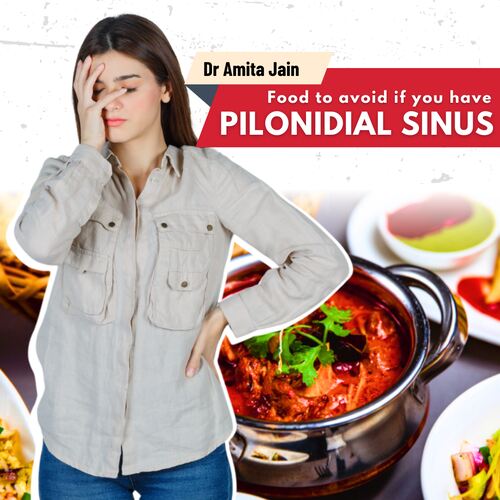Pilonidal sinus is a painful condition that involves the development of a small cyst or abscess in the crease of the buttocks. While the primary treatment for a pilonidal sinus often involves medical intervention, such as surgery or drainage, lifestyle modifications, including dietary changes, can support healing and reduce the risk of recurrence. Certain foods can aggravate inflammation or delay recovery, and avoiding them is crucial for managing this condition effectively.
Which foods should you usually avoid in case of pilonidal sinus?
According to Dr Amita Jain, one of the best laparoscopic and general surgeons and specialists for pilonidal sinus treatment in Delhi and India shares some foods you need to stay away from.
Processed and Fried Foods
Processed and fried foods, such as chips, packaged snacks, and fast food, are high in unhealthy fats and preservatives. These foods can lead to weight gain, which increases pressure on the lower back and buttocks, potentially aggravating the pilonidal sinus. Moreover, their inflammatory properties can worsen symptoms and slow healing. Instead, opt for home-cooked meals with healthy fats like those from olive oil, nuts, and seeds.
Sugary Foods and Beverages
Excess sugar in your diet can lead to chronic inflammation, which can delay the healing process of a pilonidal sinus. Foods like candies, pastries, sodas, and sugary cereals should be limited. Sugar also weakens the immune system, reducing the body’s ability to fight infections that may occur in the sinus. Consider natural sweeteners like honey or fruits as alternatives.
Red Meat
Red meat, especially when consumed in excess, can contribute to inflammation. High levels of saturated fats in red meat can exacerbate symptoms and prolong recovery. If you consume animal protein, choose lean meats like chicken or fish, which are easier to digest and have less inflammatory potential.
Dairy Products
For some individuals, dairy products like milk, cheese, and butter can trigger inflammation or lead to digestive issues. These reactions can indirectly affect the healing of a pilonidal sinus. Consider plant-based alternatives like almond milk, soy milk, or coconut milk, which are less likely to cause inflammation.
Refined Carbohydrates
White bread, pasta, and other refined carbohydrates can spike blood sugar levels and promote inflammation. These foods are low in fiber, which can lead to constipation, further aggravating pressure in the affected area. Whole grains like oats, quinoa, and brown rice are healthier options that aid digestion and reduce inflammation.
Hard Drinks
Hard drinks can interfere with the body’s natural healing process and weaken the immune system, making it harder for the pilonidal sinus to heal. It also contributes to dehydration, which can affect overall skin health. Limit alcohol consumption or avoid it entirely during the healing phase.
Spicy Foods
Spicy foods can sometimes irritate the digestive system and cause discomfort, which may indirectly affect your pilonidal sinus. If you’re prone to inflammation, it’s best to minimize the consumption of overly spicy dishes.
Managing pilonidal sinus involves not only medical treatments but also adopting a healthy lifestyle. Avoiding processed, sugary, and inflammatory foods can reduce discomfort and promote faster healing. Focus on a balanced diet rich in whole foods, vegetables, lean proteins, and healthy fats.
Staying hydrated and maintaining a healthy weight is equally important. By making these dietary adjustments, you can support your body’s recovery and lower the risk of recurrence. Always consult with a healthcare professional for personalized dietary advice tailored to your condition.

Dr Amita Jain is a surgeon with the highest degree of professional competence, precision and surgical craftsmanship. Performed all complicated general surgery procedures with in depth knowledge of invasive and few minimal invasive and onco surgical techniques. Underwent special training in trauma, executed various trauma-related complex life-saving neurosurgical procedures, reconstructed injured mangled limbs and performed vascular and reconstructive procedures with critical care.
Dr Amita Jain holds 28 plus years of rich experience in Trauma and General Laparoscopic Surgeries (including Gallbladder stone removal, appendix removal, hernia repair surgery, piles and fissure surgeries). She was the Professor Surgery of at the Army College of Medical Sciences and Base Hospital Delhi Cantt. In 1994 she was commissioned as Surgeon under the United Nations Mission in Congo. From 2020 to 2022, she worked with Bansals Hospital. Currently, Dr Amita Jain is the Senior Consultant, (Speciality: General and Laparoscopic Surgeon) at Artemis Lite Hospital, New Delhi and Sr. General and Laparoscopic Surgeon at Rainbow Children Hospitals, Malviya Nagar, Delhi.
